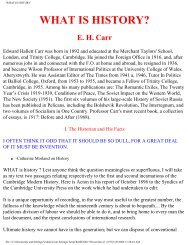The bronze age and the Celtic world - Universal History Library
The bronze age and the Celtic world - Universal History Library
The bronze age and the Celtic world - Universal History Library
You also want an ePaper? Increase the reach of your titles
YUMPU automatically turns print PDFs into web optimized ePapers that Google loves.
THE PROSPECTORS 57<br />
portrait statuettes on <strong>the</strong> alabaster sarcophagi, shows us a type corresponding very<br />
closely to Fleure's description.<br />
<strong>The</strong> Etruscans are a mysterious people, <strong>and</strong> various views which have been<br />
expressed as to <strong>the</strong>ir origin have led to no little confusion of thought. Leaving out<br />
of account such evidence as may have come down from <strong>the</strong> neoUthic <strong>and</strong> early <strong>bronze</strong><br />
<strong>age</strong>s, we find, according to tradition, that <strong>the</strong> Etruscans arrived from Asia Minor,<br />
probably in <strong>the</strong> eleventh century B.C., or perhaps a httle later. ^s About 800 B.C. we<br />
have archaeological evidence of <strong>the</strong> arrival of ano<strong>the</strong>r people from <strong>the</strong> north, who<br />
settled near Bologna, where <strong>the</strong>y developed a culture known as that of Villa-Nova. <strong>The</strong><br />
Etruscans <strong>and</strong> <strong>the</strong> Villa-Nova people certainly exchanged products, <strong>and</strong> may have to<br />
some extent amalgamated. Later traditions suggest that <strong>the</strong> Etruscans extended <strong>the</strong>ir<br />
empire over <strong>the</strong> ViUa-Nova area <strong>and</strong> to <strong>the</strong> south as well,^* but this, while true in one<br />
sense, may give a very wrong impression.<br />
I would suggest that <strong>the</strong> Etruscans proper, <strong>the</strong> Etruscus obesus of <strong>the</strong> Latin<br />
writers, were <strong>the</strong> people who so closely resemble our Prospectors, <strong>and</strong> <strong>the</strong> fact that<br />
<strong>the</strong>y are said to have come from <strong>the</strong> east, agrees well with this view. <strong>The</strong> Prospectors,<br />
wherever we meet <strong>the</strong>m, are merchants <strong>and</strong> business men, <strong>and</strong> not <strong>the</strong> kind of men to<br />
lead warlike expeditions, or to bring all Italy within <strong>the</strong>ir empire. On <strong>the</strong> o<strong>the</strong>r h<strong>and</strong>,<br />
as I hope to show in subsequent chapters, <strong>the</strong> men responsible for <strong>the</strong> Villa-Nova culture<br />
were a warlike, conquering tjTpe, given to imperial expansion, <strong>and</strong> it is far more likely<br />
that if one or o<strong>the</strong>r were <strong>the</strong> conqueror it would be <strong>the</strong> men of Villa-Nova.<br />
That such was <strong>the</strong> case seems to be indicated by <strong>the</strong> frescoes in a tomb, a copy of<br />
which is on view in <strong>the</strong> garden of <strong>the</strong> Etruscan museum at Florence. In <strong>the</strong>se we find<br />
depicted a country house, with domestic scenes, <strong>and</strong> a portrait of <strong>the</strong> owner, a fair<br />
man with a narrow face, blue eyes <strong>and</strong> brown beard, wearing a fox-skin head-dress.<br />
This man is totally unlike <strong>the</strong> Etruscus obesus of most of <strong>the</strong> o<strong>the</strong>r tomb paintings, <strong>and</strong><br />
seems to be of that fair Nordic type, which, as I hope to show, formed <strong>the</strong> ruhng caste,<br />
at any rate, of <strong>the</strong> Villa-Nova people. It seems probable, too, that <strong>the</strong> bodies buried<br />
in <strong>the</strong> Regulini-Galassi <strong>and</strong> o<strong>the</strong>r warrior tombs were also of this type.^' All this seems<br />
35 Dennis (1883) i. xxxv. ; Herodotus i. 94.<br />
36 Dennis (1883) i. xxviii., who quotes various Latin writers.<br />
37 Dennis (1883) i. 37, 264-269, 388, 413, 414, 455.







